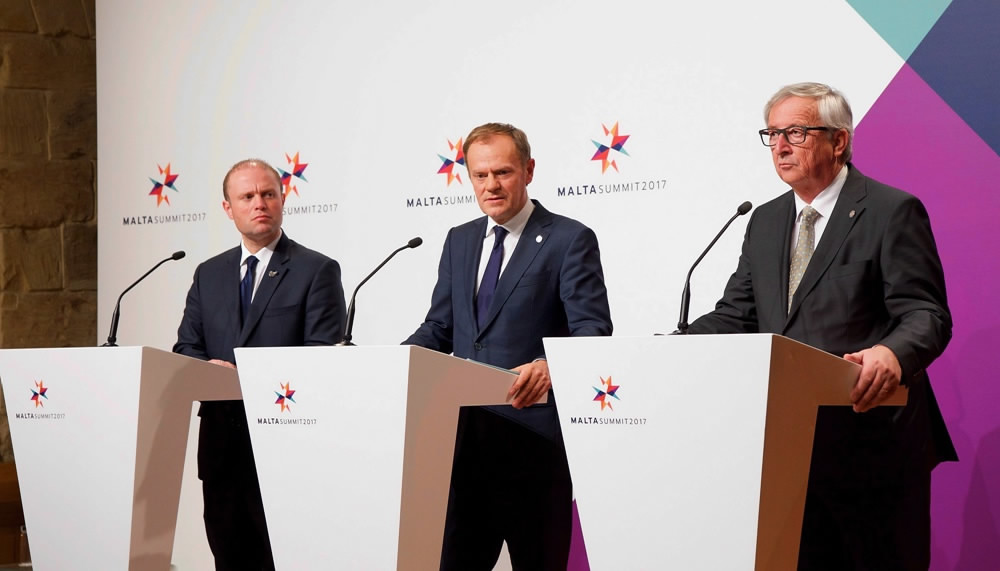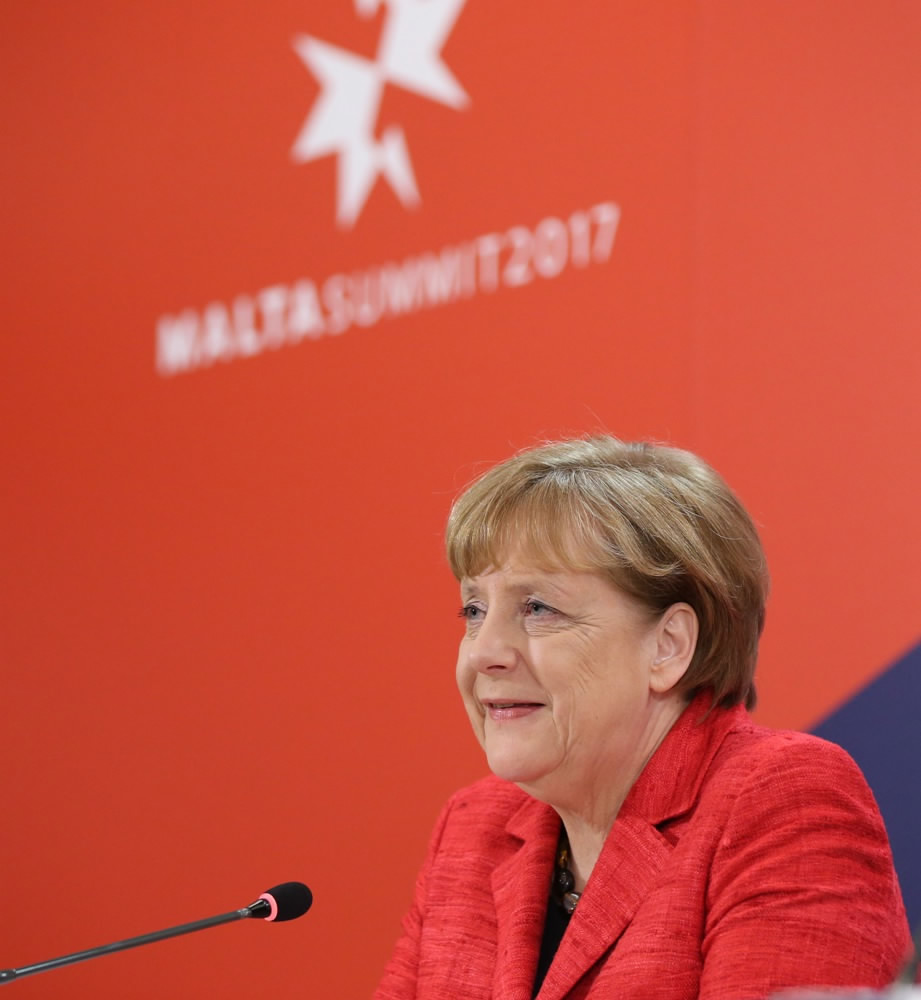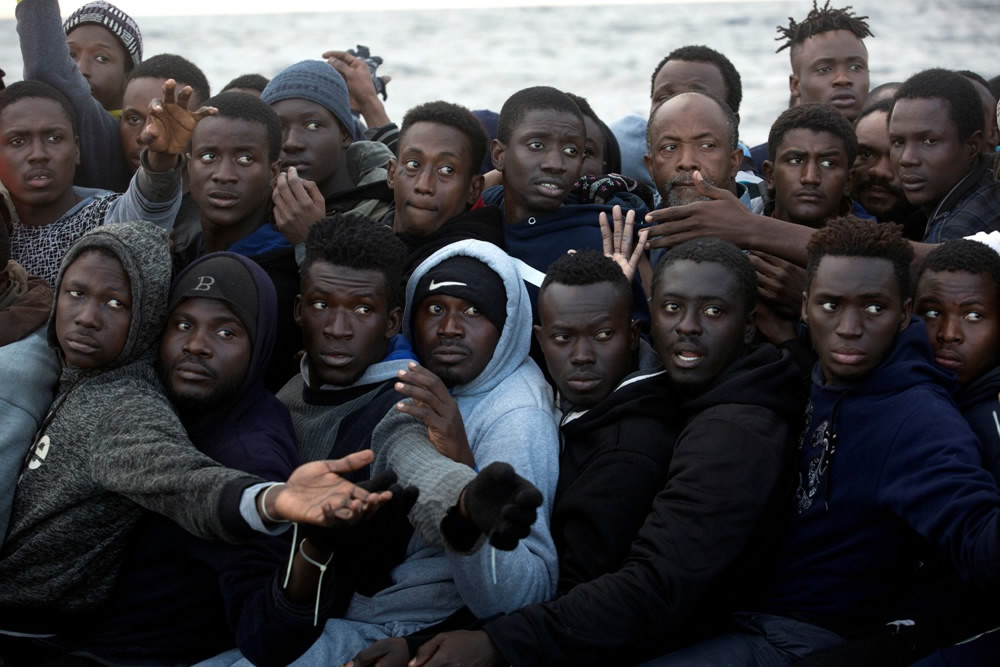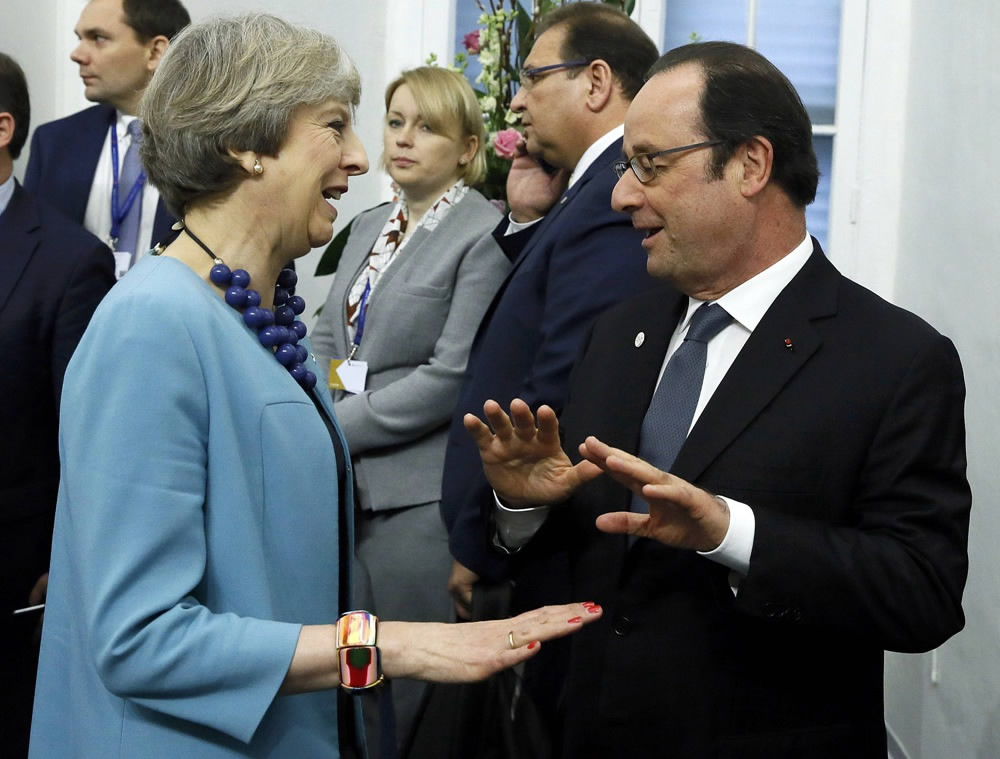European Union leaders placed a bet on Libya's fragile government to help them prevent a new wave of African migrants this spring, offering Tripoli more money and other assistance to beef up its frontier controls.
Meeting in Malta – in the sea lane to Italy where more than 4,500 people drowned last year – the leaders addressed legal and moral concerns about having Libyan coastguards force people ashore by pledging to improve conditions in migrant camps there.

Malta's Prime Minister Joseph Muscat (L), European Council President Donald Tusk (C) and European Commission President Jean-Claude Juncker (R) attend a joint press conference after the informal summit of EU leaders in Valletta, Malta on February 3, 2017. /CFP Photo
"If the situation stays as is now, in a few weeks we will have a humanitarian crisis and people will start pointing fingers, saying Europe has done nothing," said Joseph Muscat, the prime minister of Malta, which currently holds the presidency of the bloc.
"With this agreement... there is one first decent shot in trying to get a proper management of migration flows across the central Mediterranean."
Aid groups, however, accused the EU of abandoning humanitarian values and misrepresenting conditions in Libya, where the UN-backed government of Fayez al-Seraj has only a shaky and partial hold on the sprawling desert nation.
Medecins Sans Frontieres, which works on the ground, said the summit proved EU leaders were "delusional" about Libya.
"Today was not about saving lives; it's clear that the EU is ready to sacrifice thousands of vulnerable men, women and children in order to stop them reaching European shores."

German Chancellor Angela Merkel speaks during a press conference after the informal summit of EU leaders in Valletta, Malta on February 3, 2017. /CFP Photo
The chaos in Libya has thwarted any hope of a quick fix in the way that a controversial EU deal with Turkey a year ago led to a virtual halt to a migrant route to Germany via Greece, along which more than a million asylum-seekers traveled in 2015.
On Thursday, Seraj signed an agreement with Italy, which offered 200 million euros ($215 million) of its own. Rome fears new arrivals this spring, following a record 181,000 irregular immigrants last year, would put pressure on services and risk a popular backlash – especially since its EU neighbors are no longer letting most migrants travel north out of Italy.
There are legal and security challenges in cooperating on migration with Libya, where camps for migrants are run by the government and the militias alike, and offer dire conditions.
The bloc would be in violation of international law if its own vessels sent people back to Libya. Hence it wants to beef up Libya's coast guard to do it for them, and help Tripoli seal its southern border so fewer people get in.
Many EU governments are skeptical that the latest measures can have much effect on migration. One senior diplomat called it a "long shot". Several said the declaration was intended partly to appease Italian demands that the Union be seen to be acting.

Sub-Saharan migrants are seen aboard an overcrowded raft during a rescue operation by the Spanish NGO Proactiva Open Arms in the central Mediterranean Sea, 21 miles north of the coastal Libyan city of Sabratha on February 3, 2017. /CFP Photo
Longer term, Europeans are placing hopes in using their aid muscle in Africa to reduce incentives for people to leave and give governments there incentives to take back citizens who fail to win asylum in Europe. Deporting more of those who reach Italy is part of a wider plan to send signals to Africans not to risk the Sahara and Mediterranean in the vain hope of a better life.
At Agadez in Niger, numbers gathering to cross the Sahara have plunged in recent months, which some EU officials think may indicate that strategy of deterrence is working. However, people smugglers may just have altered routes.
British Prime Minister Theresa May attended despite her plan to start negotiations by next month to take Britain out of the EU – a reminder, British officials said, that she wanted to go on cooperating with European neighbors after Brexit.

British Prime Minister Theresa May (L) and French President Francois Hollande (R) attend the EU summit in Valletta, Malta, February 3, 2017. /CFP Photo
May also had briefed peers on her visit last week to US President Donald Trump, whose backing for Brexit, doubts on free trade, barring of refugees and warmth toward Russia have all raised alarm in Europe. Some European leaders disapprove of May's rush to embrace Trump, although some, notably in the east, have endorsed his tough line against Muslim immigration.
French President Francois Hollande said European governments should stick together, not seek special favors from Washington.
German Chancellor Angela Merkel said: "Europe has its fate in its own hands ... The clearer we are about how we define our role in the world, the better we can also take care of our transatlantic relations."
(Source: Reuters)
8430km










